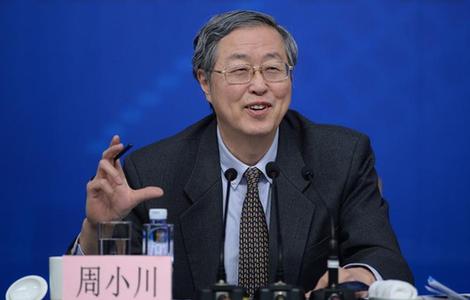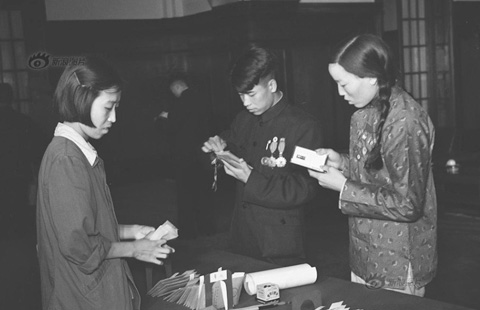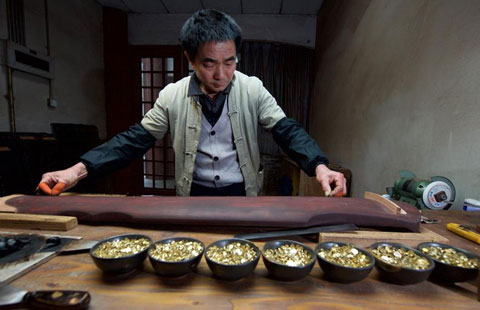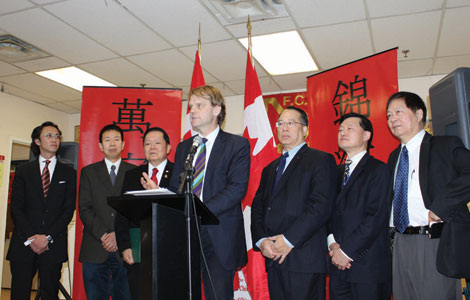Fortune favors the brave on finding market gold
Updated: 2015-03-13 07:18
By Agnes Lu in Hong Kong(China Daily USA)
|
||||||||
Investors can expect considerable profits from tong lau redevelopment, but the threshold for investing in such property can be fairly high, industry experts warn.
Besides higher acquisition prices and construction fees, buying out at least 80 percent of the building ownership for redevelopment can be quite time consuming, they caution.
However, if negotiations are successful, such projects offer attractive returns.
"If you are able to acquire ownership of the building and redevelop it, the profit will be much higher than the market average, as rigid demand in Hong Kong is still strong," said Thomas Lam, head of valuation and consultancy at Knight Frank.
But he warned that no matter whether investors plan to acquire the targeted property by applying for compulsory sale - which requires the acquisition of at least 80 percent of the total ownership with certain conditions -or via private agreements with existing landlords. "Don't be surprised if you have to spend at least three to five years on it."
According to data from the Hong Kong Institute of Surveyors, as at June 2011, about 4,000 buildings in the city were aged 50 years or older. These buildings have reached the end of their designed working life and usually lack proper repairs and maintenance. Therefore the government has been encouraging the Urban Redevelopment Authority or private builders to redevelop these dilapidated buildings, mostly through compulsory sale.
But related projects have been rare in recent years as property prices are soaring, according to Vincent Cheung, Cushman & Wakefield executive director for valuation and advisory services on the mainland and in Hong Kong, Macao and Taiwan.
Many redevelopment projects are geared toward hotel purposes these days, Cheung pointed out. "There used to be many residential-to-residential redevelopment cases before, but now we're seeing more of commercial-to-hotel cases," he said. "Commercial properties usually have higher utilization ratio, which meets the needs of hotel developers."
At the same time, many office buildings have also been redeveloped for residential purposes, Lam added, as ownerships at such buildings are less separate.
Even Victoria Allan from Habitat Property, a small-scale developer who converted the Tung Fat Building tong lau into a modern low-rise New York loft-style apartment block, admitted that projects of this kind can be hard to spot, even if a market with decent profits lies ahead.
"A lot of developers already own some units or some parts of the building, which makes others really hard to acquire now," she said. "Pricing in Hong Kong has moved so much that the entry point for developers is far higher."
Although her project involved converting the tenement building on the basis of its old construction instead of tearing it down, Allan worries that developers may be mistaken on the "right" way to redevelop tong lau.
"A lot of them have already been demolished or redeveloped into highrises," she said.
"But what matters eventually is the depth of skills of the developer to understand the design and know what your market lacks."
Cushman & Wakefield has predicted the residential property sector in Hong Kong will continue to be buoyant in 2015, while the sustained low interest rates and limited supply of investment-grade and tradable properties will support stable to slight growth of up to 10 percent across all asset classes.
Furthermore, strong first-hand sales performance last year will continue to prop up the market in 2015, while the primary market continues to account for a quarter of total transactions.
agnes@chinadailyhk.com
- Iraqi forces battle Islamic State for Tikrit on two fronts
- Venezuelans march in solidarity with govt
- Downton Abbey fan Kate Middleton visits set of hit TV show
- UK fantasy author Terry Pratchett dies
- Indian Prime Minister arrives in Sri Lanka on state visit
- Top diplomats set to meet to discuss China, Japan, South Korea summit

 Across America over the week (from March 6to March 12)
Across America over the week (from March 6to March 12)
 Money man
Money man
 14 firsts in history of 'two sessions'
14 firsts in history of 'two sessions'
 Zither village: Producer of musical charm
Zither village: Producer of musical charm
 Top 10 largest new international plants in China
Top 10 largest new international plants in China
 Picturesque scenery of red earth in Yunnan
Picturesque scenery of red earth in Yunnan
 E China villagers snatch fake goods to be destroyed
E China villagers snatch fake goods to be destroyed
 Across Canada March 13
Across Canada March 13
Most Viewed
Editor's Picks

|

|

|

|

|

|
Today's Top News
China top attendee at investment summit
China has huge growth potential: Experts
72% worry about retirement life
Apple Watch clones surface in China
Nation open to US pivot
Small Chinese firms discovering OTCBB market
Tencent, US firm join on e-books
Strong US dollar impacts world trade
US Weekly

|

|







